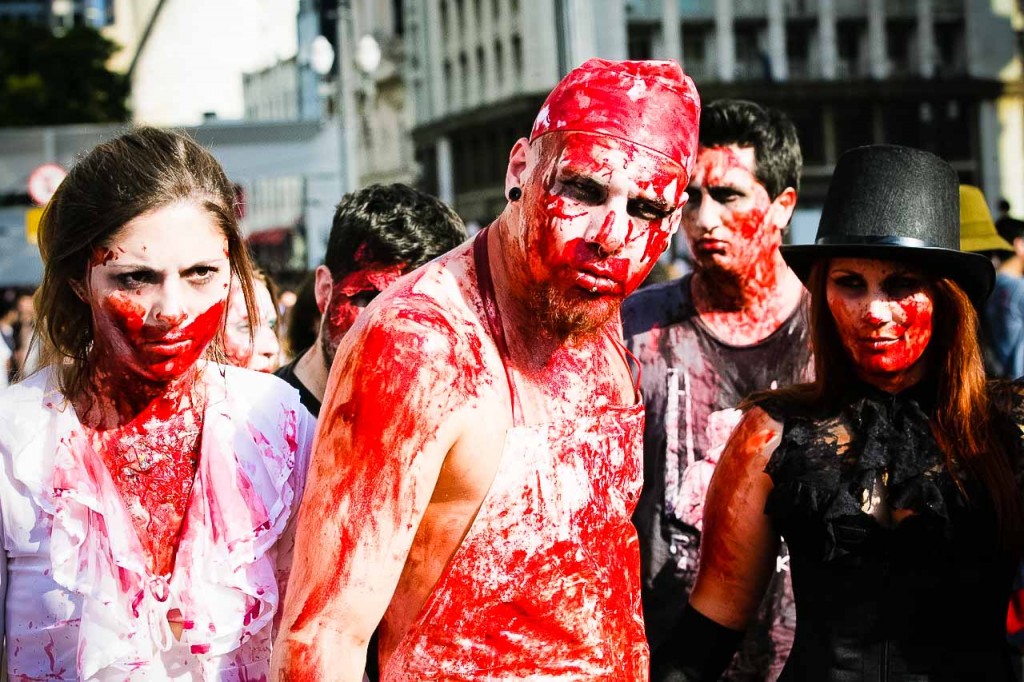
The following is a guest post, courtesy of Eric Benson.
In Canada and America, “Black Friday” (the day after Thanksgiving) is fast approaching. The ominous sounding name is hardly a bad moniker for multi-national corporations, as hoards of consumers flood parking lots, lining up sometimes as early as midnight to gorge themselves on salivating sale items. It’s the biggest shopping day of the year, and that means seemingly everything to most of the country. Black Friday was named in 1961 Philadelphia as city policeman used the term to describe the unorganized mess of people and cars lined up to shop early for the holidays. “Black Friday” slowly grew in popularity and was strategically marketed as vital to American culture (and more covertly necessary for economic prowess) until it secured the honor of “holiday” around 1975.
When director George Romero introduced the modern idea of the zombie in 1968, he created an enduring metaphor depicting the societal impact of rampant conspicuous consumption. His allegory for the consumer is a mindless empty shell connected to its fellow man only by its incessant need to be satiated by living flesh and blood. The zombie ingeniously represents the demise of free thought and critical analysis in society. Romero shows the horrors of humanity as well as the isolation and banality of our existence in a corporate-driven world. His 1978 sequel Dawn of the Dead was set in a bustling shopping mall. It was not by accident that he chose this setting to broaden his commentary on the mindless consumption that drives much of humanity.
Romero uses the phrase “they’re us” to describe the zombies. He doesn’t say they “were us,” but instead makes the distinction that we have become inhabited by corporatism mindlessly needing to devour. So consumed that on “Black Fridays” all over the country, violence is common. Shoppers have been beaten, trampled, mauled, and pepper sprayed by their own in order to be the first to feast on the best deals of the day. So consumed that “Black Friday” now has spawned cousins like “Black Thursday” and “Cyber Monday” allowing the masses more opportunity to satiate themselves on the sales that help promote quarterly shareholder profits and CEO bonuses.
It is human nature to need; however we are being tricked to buy more than we need. Advertisers have been complicit in the creation of the droves of rabid consumers that pile into malls and big box stores on Black Fridays (and others) in America and Canada. Marketing and advertising help encourage the public to gorge themselves on beautifully packaged products through irresponsible messaging tapping into human psychology of wants and needs. The desire to fit-in and to feel confident and attractive are preyed upon to create the need to want more and fill those empty voids. Corporate powers facilitate the citizenship to ravage all the pretty objects in their path. Designer John Wood writes that “(i)n 2012, while consumers are clearer about their rights, rather than their responsibilities, Utopia and Oblivion remain equally probable. In this increasingly commercial world, the citizen’s economic duty is to shop until s/he drops.” Our hunger for more seems to overpower our critical thought, rendering humanity less likely to ask, “why are we consuming?” and instead leaves us as a form negated of content, searching for some new piece of technology to keep us happy until we are hungry again.
The GDP, created by the world through sales of our consumable goods, has put humanity on an economic pedestal we have yet to see in history. However James Gustave Speth (Vermont School of Law) writes in his 2012 book, America the Possible, that “while economic output per person in the United States rose sharply in recent decades… levels of distrust and depression have increased substantially.” It seems that personal belongings have surpassed valuing personal relationships and experiences. Speth further argues that “(d)ominant American values today are strongly materialistic, anthropocentric, and contempocentric.”
Oblivion seems possible as humanity currently exhausts to so much of our natural resources that we’d need 50% more Earths to fulfill our desires. The notion of an economy based on the type of growth demanded by our economists and bankers on Wall Street and beyond (3 – 4% annually forever) is fantasy. The 2009 film Collapse wisely proposes that when, “the infinite growth paradigm collides with finite resources and energy… the economy loses.” The planet simply does not have infinite materials and supplies of clean drinking water to support the conspicuous consumption that the “Black Friday” melee advocates. Mindless consuming in Romero’s mind is the definition of a zombie. We are those zombies he portrayed in his films gorging ourselves on the red sale items at Macy’s and the flesh and blood of our future. “They’re us.”